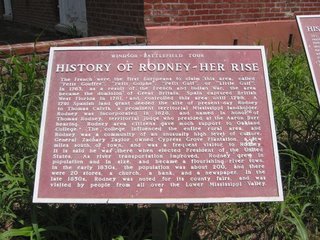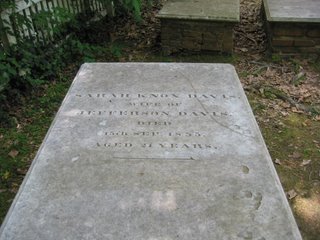One sight to see in Savannah, Georgia, is
Bonaventure Cemetery, made even more famous by the novel,
Midnight in the Garden of Good and Evil by John Berendt. While there, not only did we visit the graves of the famous, there was an unexpected genealogy angle as well. Trans- planted members of the New England Backus family (and their Georgia kin) were buried in Bonaventure. Jim took pictures of the Backus gravestones and I posted them at findagrave.com. For more information, a
search can be done.
Henry Ritter Backus was born in Lindsley, New York, the oldest son of Ebenezer & Sarah (Lindsley) Backus. His Backus lineage: (Henry Ritter7, Ebenezer6, Delucena5, John4, John3, William2, William1). I am also a descendant of William1. He also lived in Binghamton, NY, and Athens, PA, before moving south to Wilmington, NC, eventually settling in Savannah, Georgia.
Buried near Henry Ritter Backus is his wife, Helen Jewett Backus, daughter, Annie Jewett Backus, son Henry Edward Backus (and his wife Alice Hardee) and daughter Elizabeth Welch (Backus) Mason.
The book,  Biographical history of Westchester County, New York, pub. 1899, mentioned that Henry Ritter married Eliza Backus, daughter of Delucena Backus, and that Eliza was a descendant of Governor William Bradford (Mayflower). Apparently Henry Ritter Backus was named after his Aunt Eliza's husband. The book also stated that Delucena Backus married Electa Mallory. Delucena was the son of John Backus & Sybil Whiting and the grandson of John Backus & Mary Bingham. Then there was William Backus who married Elizabeth Pratt, and the next ancestor was William Backus who crossed over in the "Rainbow" and was first heard of in Saybrook, Connecticut in 1637.
Biographical history of Westchester County, New York, pub. 1899, mentioned that Henry Ritter married Eliza Backus, daughter of Delucena Backus, and that Eliza was a descendant of Governor William Bradford (Mayflower). Apparently Henry Ritter Backus was named after his Aunt Eliza's husband. The book also stated that Delucena Backus married Electa Mallory. Delucena was the son of John Backus & Sybil Whiting and the grandson of John Backus & Mary Bingham. Then there was William Backus who married Elizabeth Pratt, and the next ancestor was William Backus who crossed over in the "Rainbow" and was first heard of in Saybrook, Connecticut in 1637.
The University of North Carolina houses a manuscript by Annie Jewett Backus
Manuscript by Annie J. Backus, tracing the descent of Mrs. Thomas Pinckney Waring's family, of Savannah, Ga., from the Backus family of Norwich, England, 1637-1908. Genealogical research includes character and family sketches, ancestoral anecdotes, and childhood recollections. Parent's marriage and courtship, mother's teaching school, and author's debut in society as well as encounters with Indians, condemned prisoners, and hurricanes are mentioned.
We also visited graves mentioned in the book by Berendt including songwriting legend Johnny Mercer, as well as poet Conrad Aiken and his parents.



